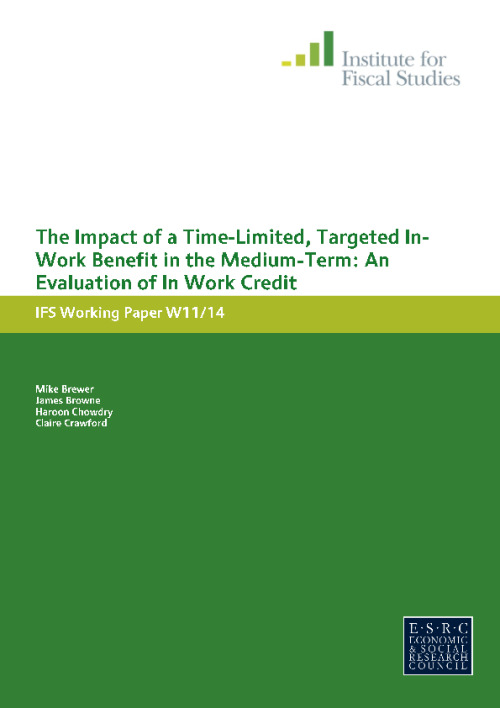Downloads

wp1114.pdf
PDF | 755.31 KB
Conventional in-work benefits or tax credits are now well established as a policy instrument for increasing labour supply and tackling poverty. A different sort of in-work credit is one where the payments are time-limited, conditional on previous receipt of welfare, and, perhaps, not means-tested. Such a design is cheaper, and perhaps better targeted, but potentially less effective. Using administrative data, this paper evaluates one such policy for lone parents in the UK which was piloted in around one third of the country. It finds that the policy did increase flows off welfare and into work, and that these positive effects did not diminish after recipients reached the 12 month time-limit for receiving the supplement. Most of the impact arose by speeding up welfare off-flows: the job retention of programme recipients was good, but this cannot be attributed to the programme itself.
Authors

Mike Brewer

Research Fellow University College London
Claire is a Research Fellow at IFS, working on the determinants and consequences of participation in childcare and education for parents and children.

James Browne

Haroon Chowdry
Working Paper details
- DOI
- 10.1920/wp.ifs.2011.1114
- Publisher
- IFS
Suggested citation
Brewer, M et al. (2011). The impact of a time-limited, targeted in-work benefit in the medium-term: an evaluation of In Work Credit. London: IFS. Available at: https://ifs.org.uk/publications/impact-time-limited-targeted-work-benefit-medium-term-evaluation-work-credit (accessed: 25 April 2024).
More from IFS
Understand this issue

If you can’t see it, you can’t be it: role models influence female junior doctors’ choice of medical specialty
24 April 2024

Spring Budget 2024: What you need to know
7 March 2024

A mess has been made of Child Benefit, and the clear-up operation may not be easy
29 March 2024
Policy analysis

Recent trends in and the outlook for health-related benefits
19 April 2024

4.2 million working-age people now claiming health-related benefits, could rise by 30% by the end of the decade
19 April 2024

Recent trends in public sector pay
26 March 2024
Academic research

Labour market inequality and the changing life cycle profile of male and female wages
15 April 2024

Interpreting cohort profiles of lifecycle earnings volatility
15 April 2024

There and back again: women’s marginal commuting costs
2 April 2024